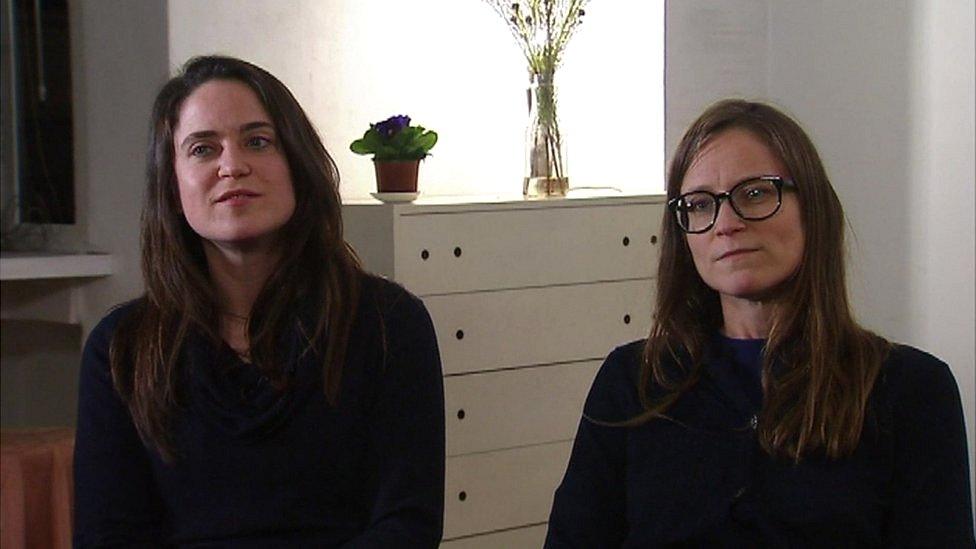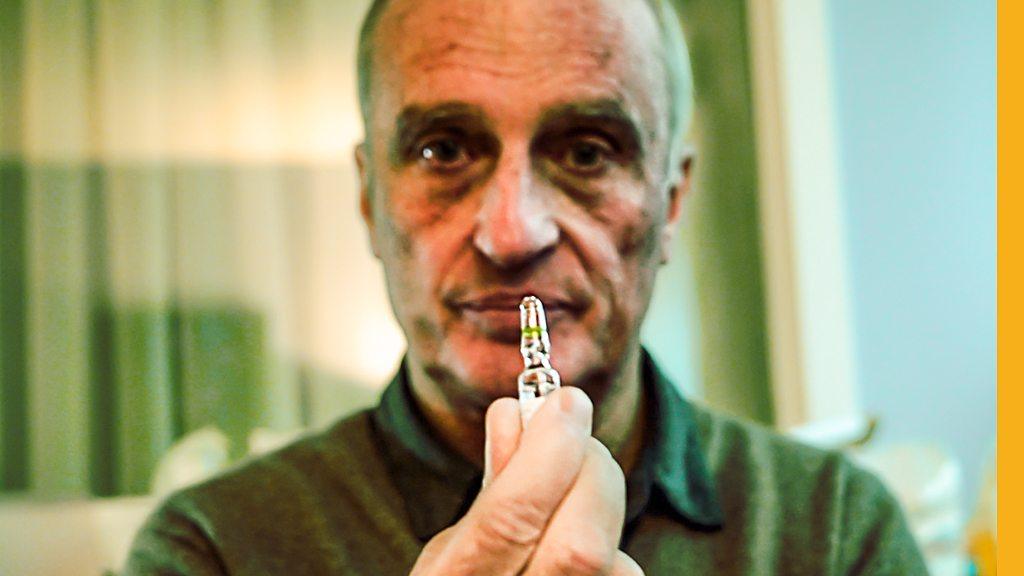Belgium euthanasia: Three doctors accused in unprecedented trial
- Published

Tine's sisters, Sophie (R) and Lotte, say her death was handled badly and doctors did not observe Belgian law
In an unprecedented case, three Belgian doctors are going on trial in Ghent accused of unlawfully poisoning a patient whose life they helped to end.
Tine Nys, 38, died surrounded by her family on 27 April 2010.
Her sisters argue that her death should never have been allowed under Belgium's euthanasia law, and that it was achieved in an amateurish manner.
Euthanasia and assisted suicide were made legal under strict conditions in Belgium in 2002.
Nys's family argue that her reason for seeking to end her life was because of a failed relationship, far short of the "serious and incurable disorder" as required under Belgian law.
The three doctors from East Flanders who are going on trial have not been named, but they include the doctor who carried out the lethal injection and Nys's former doctor and a psychiatrist. If found guilty they could face long jail terms.
A similar first took place in the Dutch courts last year, when a doctor was cleared of failing to check the consent of a 74-year-old woman with dementia who died in 2016.
What do her sisters say?
The 38-year-old had suffered a childhood of severe psychiatric problems and had tried to take her own life when she was younger. But her sisters, Lotte and Sophie, are adamant she was not incurably ill, as Belgian law requires, but suffering from the stress of a broken relationship. She had not had psychiatric treatment for 15 years.
Nys had been given a diagnosis of autism two months before her death and had not yet received treatment for it, they say.
The case is likely to rest on what constitutes "constant and unbearable suffering", which is also key to Belgian law.
The sisters also complained about the botched manner in which the doctor gave Tine a lethal injection.
"He likened her death to that of a pet that is in pain and is having a shot," they told Flemish TV in 2016.
"He also asked our father to hold the needle in her arm because he had forgotten to bring plasters. When she had died he asked our parents if they wanted to listen through the stethoscope to check her heart had actually stopped beating."
Lawyers for the three doctors have complained their clients are being treated almost as murderers, even though they acted in good faith.

What is Belgium's euthanasia law?
A patient must be legally competent and conscious at the time of seeking to end their life. The request must be voluntary, well considered and repeated.
Euthanasia: ‘I don’t feel like I’m killing the patient’
The disease must cause constant and unbearable physical or mental suffering, external, resulting from a serious and incurable disorder caused by illness or accident, according to Belgium's public health service.
Where a patient is not expected to die soon, the doctor must consult a second physician and allow at least a month from the request before euthanasia takes place. Physicians are free to perform euthanasia if the conditions are met or refuse if they do not wish to.
Living with euthanasia: Marieke's story
Last October, renowned 40-year-old Belgian Paralympian Marieke Vervoort ended her life 11 years after signing papers to allow a doctor to end her life. She had an incurable degenerative muscle disease that caused her constant pain, seizures and paralysis in her legs. She won gold and silver at the London 2012 Paralympics.
Tine Nys's sisters have emphasised they consider euthanasia necessary in some cases but want the law made clearer.
Since 2014, Belgium has allowed minors to be helped to die as well as adults, if they are terminally ill and in great pain and if they have parental consent.
According to Belgian media, there were 2,357 cases of euthanasia in 2018, equivalent to more than six a day. The majority involved people aged over 60 and took place in Belgium's Flemish north.

- Published14 June 2019
